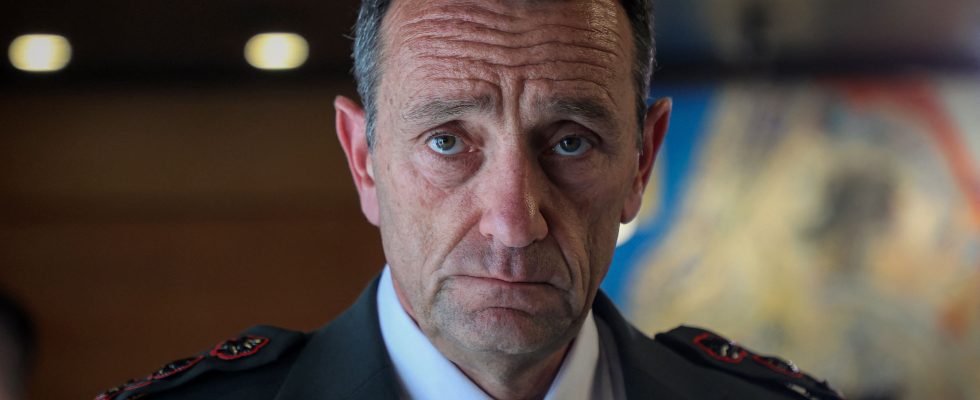A week after visiting them in the Gaza Strip, with helmet and bulletproof vest, it was from the air, aboard a small twin-engine plane, that the commander of the Israeli forces, Herzi Halevi, came to observe the relentless advance of his troops. In a sound recording released by the authorities, he can be heard encouraging the soldiers of a brigade by radio: “Tell all your people that you are accomplishing an important task, that everyone is behind you, […] may the entire Israeli army work to enable you to advance until victory!”
His task is considerable. At the head of an army guaranteeing the sovereignty of the country in the face of the threats surrounding it (Iran, Hezbollah, Palestinian groups, Syria), Herzi Halevi, this 55-year-old general – who has the same first name as a deceased uncle during the Six Day War, a few months before his birth -, must ensure the present and future security of his fellow citizens.
“We failed,” he logically admitted, after the massacre of 1,200 people by Hamas on Israeli territory on October 7. This is all the more true regarding him, as he monitored the terrorist group when he headed Aman, military intelligence (2014-2018), then the southern command (2018-2021), responsible for deterring Hamas. “He was very affected, and experienced this as a personal failure,” confides military analyst Ron Ben-Yishai. “But he very quickly refocused on his mission at the head of the IDF.”
“We are going to enter Gaza, destroy the infrastructure and the Hamas terrorists, and we are going to do it in a professional manner,” he assured before the forces entered the enclave, after three weeks of planning and execution. final training sessions. Following an intensive bombing campaign which left thousands dead, the north of the strip was sealed off, while its civilian population was ordered to take refuge in the south. The option chosen: slow and strong progress on the area placed under cover. “The Israelis did not rush headlong, as Hamas probably expected, it is a very gradual advance, in the manner of what the United States did in Fallujah, in Iraq”, estimates a French military source.
“A thinker”
The Israeli army must nevertheless deal with pressure from international opinion, often shocked by the images of civilian victims in Gaza, and is called upon by a number of countries – including the United States – to respect the laws of war. While the way he currently conducts operations is under international scrutiny, he has in the past earned a reputation as an officer who is meticulous about respecting legal standards, not hesitating to dismiss soldiers guilty of ethical violations during the 2009 intervention in Gaza. “Even though he is a courageous person who has participated in many operations, he is considered a thinker,” explains Ron Ben-Yishai. He thus claimed to draw in philosophy, studied at university, “in a much more practical way” than in what he learned from his business administration courses.
Under his orders, the Israeli army strives to convince – without always succeeding – that it is using proportionate force, emphasizing the cynicism of Hamas, whose infrastructure is hidden within civilian sites. “To control the use of force upstream, the army has legal advisors, integrated into the general staff and with officers on the ground, to ensure that the rules of engagement set by the high command military are respected”, argues David Khalfa, co-director of the North Africa and Middle East Observatory of the Jean-Jaurès Foundation. But it is anything but perfect for the head of American diplomacy, Antony Blinken, who recalled that “there is still much to do in terms of protecting civilians and delivering humanitarian aid”.
Herzi Halevi is also keeping his forces, reinforced by 360,000 reservists, on maximum alert, facing the risk of a new war on the Lebanese border against Hezbollah or a new major cycle of violence in the occupied West Bank, where more than 190 Palestinians have been killed by Israeli soldiers and settlers since October 7. And even if the army succeeds in destroying Hamas’s military capabilities in the northern part of Gaza, attacking the other part of the enclave would still prolong a war very costly in civilian lives. “This conflict politically weakens American President Joe Biden with the left wing of the Democratic Party, and the more time passes, the more the patience of the United States, which could soon demand a truce [NDLR : et non plus des pauses humanitaires], is fading away, notes David Khalfa. In the southern part of Gaza, the Israelis could opt for strike operations carried out by special forces.
Mutual distrust
Herzi Halevi also has to deal with Benjamin Netanyahu. Opposition to the controversial reform of the judicial system carried out by its coalition government with the far right has reached as far as the army: more than 10,000 reservists joined the protest movement in July by declaring that they would no longer stand volunteers. A mutual distrust still animates the military and a Prime Minister ready to do anything to stay in power, despite his dizzying fall in the polls.
In this context, Netanyahu does not hesitate to blame his generals. “Never, under any circumstances, has the Prime Minister been alerted to the warlike intentions of Hamas,” he wrote on his X account (formerly Twitter) at the end of October, before the message was removed and he apologizes. Like Herzi Halevi, he will have to answer for his actions before the commission of inquiry called to shed light on the root causes of the failure of October 7.
.
